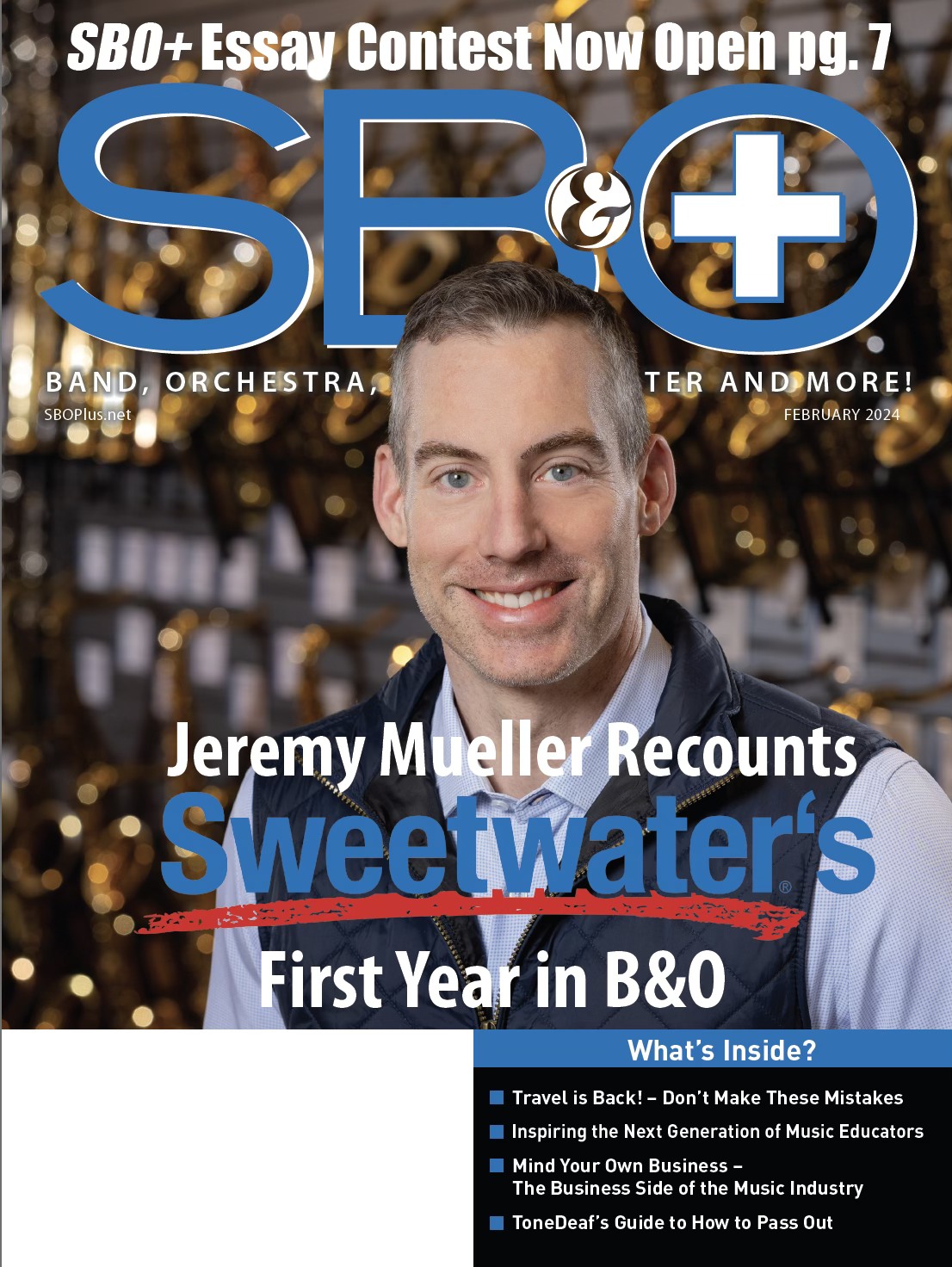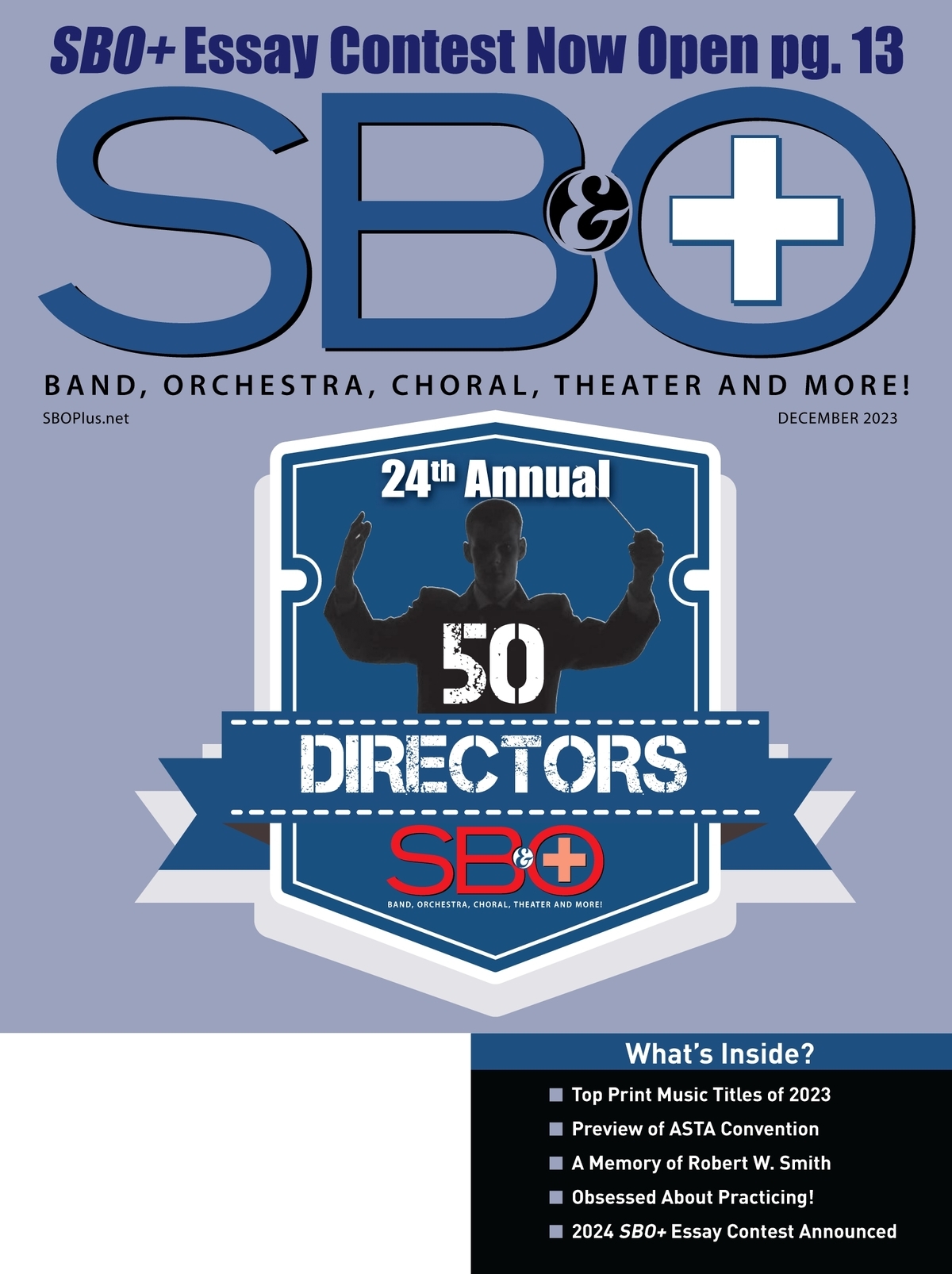EDUCATORS SUBSCRIBE FOR AS LOW AS $0.00! CLICK HERE!
-

Brandon Valley Band’s Web Site – Where Form Meets Function
Mike Lawson | October 23, 2006 Read More... -

Guest Clinicians: Inviting a Clinician into Your Ensemble
Mike Lawson | October 22, 2006
By Amy M. KnoppsPreparing for a major performance is a stressful time in the lives of many music educators; it is, however, an ideal time to invite a guest clinician to work with your ensemble. It is a point in the year when students are the most focused, playing their best, and working the hardest toward a common goal: an outstanding concert.
A clinic session for your ensemble can be very rewarding. Proper planning on your part can make a clinic even more satisfying for your ensemble, for you as a music educator and for the guest clinician. This article provides a step-by-step approach to making a guest clinician experience both valuable and productive for you and your students.
Benefits of Working with a Guest Clinician
Read More... -

The Best and Worst Job in Public Education
Mike Lawson | October 22, 2006
By D.L. JohnsonThis is kind of a tough topic to cover. I know most educators will say they have the best and worst job in public education. However, there is nothing similar in education to the trials music educators face. The extremes in "highs and lows" that high school band and orchestra directors experience day by day would challenge even the best of educators. Ask yourself: how many classroom teachers are required to put their classes up in front of the general public (performances) and be judged directly by colleagues and parents as to whether they meet the subject standards, or for that matter, are a good or bad teacher? This has a direct impact on the longevity of music educators in the profession. I have heard the average high school band director lasts as little as four years in the profession before getting out. (I believe the longevity of school superintendents is just about the same.)
This summer, I attended the final concert night of the Monterey Jazz Festival Summer Jazz Camp. As we watched seven complete jazz bands perform their hearts out to an ecstatic standing-room-only audience, one thing prevailed over the entire auditorium - "Smiling Parents." It was the same jubilation I had seen and heard over and over at the many concerts I had conducted or performed throughout my teaching career. I know many of you know what I am talking about.
As the concert proceeded, I wondered how many parents knew the incredible sacrifices the directors of these fine young musicians had gone through just to get their child into a camp like this. Just how many of those parents knew the real battles each and every high school and middle school band and orchestra director was going through nowadays? Battles faced every day by directors throughout the education world. Battles not even conceived of by regular classroom teachers. The teaching of music has changed. There were other band directors at that jazz concert. I know they were getting one of the few rewards we get as directors - "A tremendous sense of accomplishment."
Read More... -

Because I Said So’
Mike Lawson | October 21, 2006 Read More... -

UpClose: The Gift of Attention
Mike Lawson | October 21, 2006By Joseph Alsobrook
The following is an excerpt from the book. Pathways: A Guide for Energizing & Enriching Band, Orchestra, & Choral Programs by Joseph Alsobrook G-5641(Chicago: GIA Publications, 2002), 30-54. Used with permission. www.giamusic.com. (800) 442-1358.
All students long to be noticed. In fact, 100% of 22,000 teachers polled in a survey given by the Carnegie Foundation described their students as "emotionally needy and starved for attention and affection."16 This speaks for itself and emphasizes the need to take (make!) the time to help each student feel valued and important in positive ways. In The Joy of Inspired Teaching, Dr. Tim Lautzenheiser illuminates this point:
Read More... -

George N. Parks
Mike Lawson | October 21, 2006In the first grade, he revealed his earliest tendencies toward a career as a marching band director: he conducted the woodblock band.
By ninth grade, he’d decided he wanted to pursue a career as a band director and, soon after, began his training as the drum major of his high school band. As a member of the Reading Buccaneers in Pennsylvania, he served as drum major for 13 of his 14 years with the drum and bugle corps. And for the past 27 years, George N. Parks has been at the helm of the 300-member Minuteman Marching Band at the University of Massachusetts-Amherst.
It seems that directing bands runs in his family.
Read More... -

UpClose: Overcoming “Non-Musical” Challenges A Chat With Dr. Tim Lautzenheiser
Mike Lawson | October 18, 2006 Assuming that most who choose to pursue a career in music education have a genuine interest in, and passion for, exposing young minds to the rich world of music performance and scholarship, why do so many cease teaching – often after a relatively short span of time? Is it the pay? The workload? Bureaucratic […] Read More... -

SBOSurvey: Fundraising
Mike Lawson | October 18, 2006SBOSurvey: Fundraising
All music educators want the best for their program and their students, but very few are lucky enough to easily achieve all their goals without augmenting the "official" school budget.To incorporate more ambitious elements, such as travel, into an overall curriculum - as well as addressing the more fundamental needs of music education (instruments, uniforms, equipment) - most directors turn to fundraising efforts to bring more revenue to the program.
SBO recently asked our readers to provide some feedback on what fundraising strategies have proven to be most successful and what role, in general, fundraising plays in supporting the efforts of the student musicians in their schools.
What types of fundraising have been most successful for your program?
Read More... -

SURVEY: RECRUITMENT AND RETENTION METHODS
Mike Lawson | April 1, 2004Unity. Without it, your music group would fall apart during performances. The clarinets would play two beats behind the trumpets. The flutes would play in a different key. And the tubas would be working on the theme to Star Wars while the rest of the class plays Mozart.
But did you know that unity among the music educators in your district is equally important to the success of your program?
"When you see one director, most of the time, you see all of us," said Cathy Fishburn, orchestra director at Doerre Intermediate School in the Klein Independent School District in Texas.
Read More... -

Momentous Marching Moments
Mike Lawson | August 1, 2003Fans of college marching bands know just by watching the halftime show that the musicians on the field are talented, entertaining and athletic. But many of these college marching bands have more than school spirit, professionalism and showmanship on their side. Each year’s batch of marching band members must follow in the footsteps and uphold the traditions of their predecessors.
So what, exactly, do these bands have to look up to? SBO dug into the colorful histories of some the country’s favorite college marching bands to find out.
Read More... -

SURVEY: BOOSTING YOUR BOOSTERS PROGRAM
Mike Lawson | June 1, 2003In today's struggling economy, when budget cuts affect arts and music programs, it's heartening to see that one source of support for music educators remains strong: boosters organizations. Based on a survey of nearly 200 band and orchestra directors at the middle and high school levels, 91 percent of schools have some boosters organization in place. More importantly, over 40 percent of the directors polled insisted they have an "excellent" relationship with their boosters organization, while another 29 percent called the relationship "very good."
Only a very small percentage, one percent, feared that their parents held too much power over the music program. Strong bylaws that spell out the purpose of the organization as a support group, outlining what areas fall within the group's jurisdiction, can help prevent problems before they begin. By fostering an environment of mutual respect, making sound decisions for the band, and always communicating with parents, a music director should be able to enjoy support from his or her boosters group without worrying about "Monday morning quarterbacking" by well-meaning parents.
Read More... -

REPORT: UNIFORMS AND FOOTWEAR
Mike Lawson | May 1, 2003Since the first military marching bands stepped off centuries ago, uniforms have been part of the marching tradition. Today, high school marching bands carry on that tradition while playing in parade formation or performing a field show at halftime. After all, acting as a "uniform" group is what marching band is all about: marching in step, playing together, executing field show maneuvers in unison, traveling as a parade unit. During a field show routine, any marching band member who does not fit into the band's uniform appearance will certainly stand out. At marching band competitions, the slightest deviation from uniformity will typically yield point deductions.
Uniforms are worn to give a band a professional, "together" look. While many band members wear their uniforms proudly as a member of a "team," there is a minority group of students who voice concern regarding the school uniform. John New, band director at Dennis-Yarmouth High School in South Dennis, Mass., for instance, stated that a handful of his students felt they would be viewed as "nerds" by their peers for wearing uniforms.
With this thought in mind, SBO polled a sampling of the uniform and footwear companies that serve the marching band market. All expressed their belief that contemporary styles and fabrics combined to create a "uniform" look that instilled a sense of pride and accomplishment among band members.
Read More...





